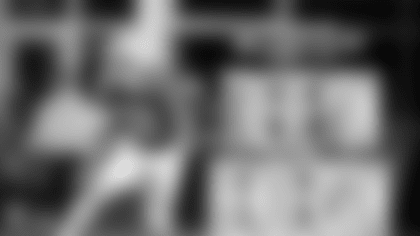SAFETY DEVIN MCCOURTY
Press Conference
Wednesday, January 1, 2020
Q: Is this one of those games, because of how the Titans attack, for the "get-back" football?
DM: You guys love that.
Q: I'm asking because I know a lot of the stuff comes from after catch.
DM: I would say tackling is bigger than even that. Obviously, they've got a lot of guys that can beat you vertical, but you watch them – it's a quick slant or a slim post and A.J. Brown catches it, now he breaks a tackle and now you're trying to catch a guy that you're not going to catch, or Derrick Henry gets an open field, or Corey Davis makes a play. They can still – like Tajae Sharpe ran a stutter and go against Jacksonville and got behind. They still have those vertical-nine routes. A.J. Brown ran one against Houston, 60-yarder. But a lot of the plays, even the reverse he had against New Orleans, breaks a tackle and now he's gone. Jonnu Smith – the guy that people really don't talk about a lot in that offense – he has a toss-play for 60 yards, he has a quick slant for like another 50 yards. A lot of it is going to come down to, obviously, you can't let the ball behind. You can't let your guys run by you. We've got to do a good job when they make catches of everyone getting to the ball and tackling because they've got a lot of big, strong, fast guys on that team, a lot of guys that don't really look like they fit in the position they're in. Derrick Henry, A.J. Brown, guys that are huge, playing different positions and they're really good at it.
Q: How much has Ryan Tannehill changed over the last year?
DM: I'm not a QB guru. He's playing really good football, he's doing a good job – draw back, third down, finding an open guy. He's doing a great job in the play-action. And then I think he does a really good job – he never looks like he really wants to run, but the dude is fast so when he does run, he's able to make big plays like you see on some of those boots. They run a boot and no one's contained and so he just acts like he's going to throw it and there's like no one in front of him for 20 yards, so he just runs. I think he's doing a really good job of just running the offense, finding these guys when they're open, doing a really good job of understanding – it looks like he knows what defenses are in, and he's just getting the ball to the open guy. He's always had a very, very good arm throwing the ball down the field, pretty accurate at throwing throws, deep balls, intermediate routes. We've seen him for years, we've been a part of some of his best games in Miami, so we know what he's capable of and we've watched how he's leading that team.
Q: Can you take anything from the joint practices during training camp?
DM: I think you know some of their personnel, like we're not going to be surprised when A.J. Brown comes out there and he's running or Corey Davis or [Kalif] Raymond when he's out there. We saw him in camp how quick and fast he is. I think that stuff always helps. When you get out there sometimes, you watch guys and watching them on film is one thing, but then you see them in person. We've kind of got that, when we went against them in the joint practices and saw some of those guys running and what they're able to do. I think from a personnel standpoint, you still have some of those reps you've taken against them that you know. You don't really lose that as a defender, as a player. When you go against someone, you remember those players and what they do well.
Q: Coach Bill Belichick said yesterday that you guys came in with a good attitude. Was that instantaneous after the game against Miami? How did it go when trying to turn the page?
DM: We came to work Monday. We have guys in that locker room who have never had the experience playing that last game on Sunday and your season will be over and we have guys who have. Those guys always give great perspective of what it means to play in the playoffs, of that last game and already knowing where you're going on vacation. We had guys talk about that, and I think the realization was after how bad Sunday was, we came in the next day and we had to work. We had stuff that we wanted to accomplish and we got the opportunity to do it, so because of how we played in the regular season, we get a chance to play in the postseason. It didn't end the way we wanted it to, but I think it would really be bad to let one loss disappoint the whole rest of the season because we stayed and stuck on that. We've got a veteran group, we've got guys that understand that, and we're excited about this opportunity. We're going to work our butts off to be able to be prepared and go out there and play a tough game Saturday night.
Q: How big is it this week for the safeties to help the corners with inside help to cut some of those crossers off?
DM: Everything's big when you talk about communication, our corners knowing where we're at, us being where we're supposed to be, them being where they're supposed to. I think that's always key. This offense does a good job of attacking certain areas of the field. We've got to be aware of that, we've got to know whose responsibility that is on each play. On our defense, we're always calling with different things, so it will be different guys. It's going to be key for us as a secondary, biggest game of the year, to be on point. We can't have any lapses in communication or knowing where each other's at. That's going to be big for us. We're going against a very talented group. Every guy on that field in a skill position is fast. They don't really put anybody out there that's not fast for the position and able to create really big plays. I think that puts pressure on us and that's what you want this time of the year, to go out there and play your best football.
Q: How much does it help their play-action game that Derrick Henry is the back in the backfield? Does it change your approach knowing the league's leading rusher is in their backfield?
DM: No, not for me. I mean, it's tough. We've got to find a way to bring him down, but I always say you get in trouble when you're supposed to play middle of the field and you're worried about tackling Derrick Henry for 5 yards. Like, if that's happening, it's going to look great on one play. Everyone's going to get up – you made a tackle for 5 yards or 3 yards – but, the very next play is going to be a play-action. They're going to throw the ball over your head. So, I think when you play teams where they have the leading rusher, and they have a quarterback with the highest passer rating, and they have A.J. Brown, Corey Davis, Sharpe. They've got a lot of guys – Jonnu Smith – making big plays. You've got to count on each other. We've got to trust each other out there on the field that if it's a run play the guys up-front that are in position to play the run are going to play it, and then if it's play-action they've got to trust that the guys in the back-end are going to be ready to play the pass. And we've got to do that for 60 minutes.
Q: What have you learned about Dont'a Hightower that has made him so dependable in these big games?
DM: I think his worth ethic. He came in here obviously from Alabama, a guy that was a leader and knew the defense well coming in, and he's continued to do that. He's been a leader for us. He's been the guy that calls the huddle. He knows where everyone's aligned, and I think he doesn't budge in these big games. He goes out there and plays his best. He's a guy when we haven't had him, we've missed him a lot, and when we do have him, it's a pleasure to have him out there. We know he's going to make plays because he knows where he's aligned, he knows where everybody is supposed to be and we kind of count on that.
Q: Tennessee plays one of the highest percentages of 12 personnel. What sort of challenge does that present you as a defense?
DM: I think it's even what kind of 12 is it? Is [Anthony] Firkser in there, and now you have him and Jonnu Smith? Now is it 12, or is it four-wide? You know, both those guys can split-out and now it's like having four receivers. Or, [MyCole] Pruitt's in there and Pruitt can be in the 12 with two tight ends, or he can start in the two tight end look and then shift into the backfield and now he's like a fullback, so now it's really 21. So, I think they understand when they put 12 out there, it's still up to them of how they want to play it. I think you see that more now in the NFL with so many kind of versatile guys that play tight end, but are kind of like a receiver or kind of like a tight end and a fullback. So, I think we have to be aware of what is it like? You know, it's 12, but is it playing like true 12? Is it playing like 21 or 11? And then I think we have to go from there and understand how they're going to want to attack us, and then – most importantly – know what we're in and know what our jobs are.
Q: Formations with three tight ends are rare and teams have had success running that 13 personnel against you. What makes that personnel grouping difficult to defend? Are there personnel swaps that you need to make to match what they're doing?
DM: Yeah, I think it gives the offensive coordinator a lot of options. You know, when you put that out there, I think the offensive coordinator is now looking to see how we're going to match it. And then, what does he want to do from that? Are we going big people, are we going small? Do I want to run it, do I want to spread it? I think you have so many matchup issues when you go 13 and you have tight ends that are versatile that you have to be able to match them and play to however they're using them, and you really won't know that until the game gets going. You don't know 13 – especially for this team – you run 13 and you still have Henry in the backfield. You can go 13 – three tight ends – and kind of run smash-mouth football and run the ball. But, you could also go 13, and spread it out and it's 11. And now you're throwing the ball downfield, you're going hard play-action. So, they have a lot of variables, I would say, out of 13, and 12, and really 21 for that matter, too.
Q: How do you make sure that home-field advantage matters as you go through these games?
DM: I've been hearing it for 10 years – Bill [Belichick] coming in here and he tells us home-field, experience, all of that doesn't matter in the playoffs. And it's true. Each year you see – like this weekend – you could see three teams, all away teams, win. You don't know. It's all about going out there and playing your best football, and I think that's what it is for us. Last year, we had to go on the road to win to go to the Super Bowl, and we had no shot to everybody to do that. It comes down to playing your best football. So, Tennessee's going to come in here Saturday night, everyone's going to tell them they have no shot, Patriots don't lose at home. They don't care about that. They're preparing to come in here and play us tough, and I think that's what we have to match. All that other stuff is kind of thrown out the window – how many wild card games has this guy played, or playoff games? You know, Tom Brady has more playoff games than everybody that's going to suit up Saturday, but that doesn't mean we're going to win. We've got to outplay these guys and we've got to do it for 60 minutes.
Q: Brady was very hard on himself for missing throws last week. What have you noticed from him this week, how has he responded from that?
DM: The same. He's always going to be hard on himself, but I've always said I think the best thing about being a player here, and a young player and getting the opportunity to come in here and work with him is that he doesn't change. It doesn't matter if he plays great on Sunday or if it's not his best one, he still comes in here each week and he works his butt off. He's on guys about being ready, and I think it's like that for all of us. Especially, you know, the older you get, you get to play in these playoffs you don't really know how much longer. You don't know next year, is it going to be the same? Is your team going to make the [playoffs] – so, you want to take advantage of all these opportunities. I try to tell the young guys the same thing, and I think Tom exhibits that every time he comes out here on the field, and the playoffs are no different. I think he's probably even more on it. He's probably studying more at home. I think all of us have that mentality. You know, you do a little bit more because the honest part of this is this could be our – I mean, I guess today's Wednesday, but for us it's Thursday – this could be our last Thursday of the year. So, it won't matter if you didn't watch the extra film if next week you don't have anything to do anyway. So, I think we all have to have that mentality that Tom has of just making sure we do everything we can to try to play next week.
Q: Last time you played on a Saturday, the building was electric and you guys seemed to feed off of that. How important is that for you guys, and what do you expect the intensity level to be like for this game?
DM: I think that's the cool thing about playing at home is your fans are going to come out, and then it's up to you. I think our fans will come in here, they'll be ready to probably go around six-thirty, seven o'clock, all hyped up about the game. But, it's up to us, how we come out and play. If we execute, we give them something to cheer about, I think we'll control the energy in the stadium. And I think that's what we have to do all week. We can't worry about who's coming, are they going to be – if we just get ready, and we start fast and we play good football, we complement the offense, the offense complements us, special teams goes out there and creates good field position for both sides, I think the crowd will be electric. Not just for a quarter or two. They'll be electric for the whole game, after the game. They'll be all into it. And I think for us as players, if we want that kind of energy, we've got to start doing it yesterday, today, and then we've got to finish it off tomorrow, last day on the field. So, I'm excited. We've got a good group. Guys have been locked in this week. It's about keeping it going and then finishing at the end of the week.









































